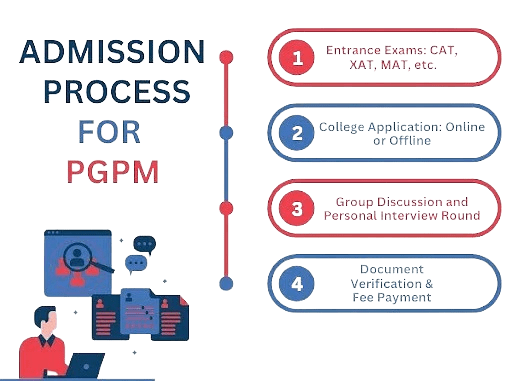
- Introduction
- Full Forms & Definitions
- Course Duration
- Curriculum Differences
- Recognition & Accreditation
- Industry Acceptance
- Admission Criteria
- Career Opportunities
- Skills Acquired
- Salary Comparison
- Institutions Offering Each
- Verdict
Introduction
When it comes to pursuing postgraduate management education in India, aspirants often face a common dilemma of whether to opt for a PGDM (Post Graduate Diploma in Management) or a PGPM (Post Graduate Programme in Management). Both are popular choices and offer high-quality education, but they differ in structure, recognition, duration, and career prospects. This comprehensive guide explores The Differences Between PGDM vs PGPM to help students make informed decisions based on their career goals.
To Explore PMP in Depth, Check Out Our Comprehensive PMP Certification Training To Gain Insights From Our Experts!
Full Forms & Definitions
PGDM (Post Graduate Diploma in Management): PGDM is a diploma-level program in management, typically offered by autonomous institutes that are approved by AICTE (All India Council for Technical Education). Since these institutes are not affiliated with universities, they cannot confer degrees, hence the term “diploma.”

PGPM (Post Graduate Programme in Management): PGPM is generally a certificate program or diploma-style course offered by private institutes or B-schools. The structure and duration of PGPM programs can vary significantly. Unlike PGDM, PGPM is not standardized under a single regulatory framework, which leads to greater flexibility and variability in delivery.
Course Duration
- The duration of PGDM programs is usually two years, similar to an MBA. PGDM courses follow a trimester or semester system and involve extensive coursework, internships, and projects. Some PGDM institutes offer fast-track one-year executive PGDMs for working professionals.
- PGPM, on the other hand, is typically offered as a one-year full-time program. It is designed for working professionals who want to accelerate their career growth in a shorter span. Due to its shorter duration, PGPM programs are more intensive and focus heavily on applied learning and real-world exposure.
- PGDM programs are designed with industry requirements in mind. Since they are not bound by university norms, institutes offering PGDMs have the freedom to revise and update their curriculum more frequently. This results in a curriculum that is more dynamic, industry-oriented, and relevant to current business trends.
- PGPM programs also offer an industry-focused curriculum, but due to their shorter duration, they focus more on experiential learning, case studies, and skill development. The theoretical depth may be slightly lesser than PGDM programs, but they provide valuable practical exposure and leadership training.
- PGDM programs have wide acceptance across industries. Graduates are recruited in various sectors such as banking, FMCG, consulting, IT, and manufacturing. Companies recognize the comprehensive nature of PGDM programs and consider them equivalent to MBAs.
- PGPM graduates are also well received in the corporate world, especially in roles requiring leadership, project management, and domain expertise. Because PGPM students usually have prior work experience, recruiters often view them as industry-ready professionals who can contribute from day one.
- PGDM graduates have a wide array of career opportunities across multiple industries. Common job roles include Business Analyst, Marketing Manager, Financial Analyst, Product Manager, Operations Manager, and HR Specialist. Top recruiters include multinational corporations, startups, government bodies, and consulting firms.
- PGPM programs are designed to fast-track the careers of professionals. Graduates often take up mid-level to senior-level roles such as Project Manager, Business Consultant, Strategy Manager, Product Head, and Operations Lead. Due to the work experience requirement, PGPM graduates tend to enter the job market at higher positions compared to fresh PGDM graduates.
- Indian Institutes of Management (IIMs)
- Xavier School of Management (XLRI)
- SP Jain Institute of Management and Research (SPJIMR)
- Institute of Management Technology (IMT)
- FORE School of Management
- Indian School of Business (ISB)
- Great Lakes Institute of Management
- Management Development Institute (MDI)
- SPJIMR (also offers PGPM apart from PGDM)
- IFMR Graduate School of Business
Are You Preparing for PMP Jobs? Check Out ACTE’s Project Management Interview Questions & Answer to Boost Your Preparation!
Curriculum Differences
Recognition & Accreditation
PGDM programs offered by AICTE-approved autonomous institutions are well recognized in India and abroad. Some top B-schools offering PGDMs are also accredited by international bodies like AACSB, AMBA, or EQUIS. Institutes like IIMs, XLRI, and SPJIMR offer PGDM programs with global recognition. PGPM programs do not follow a uniform accreditation system. Their recognition largely depends on the reputation of the institute offering the program. However, well-known B-schools such as Great Lakes, ISB, and MDI offer highly reputed PGPMs that are recognized by top companies and global academic institutions.
Industry Acceptance
Are You Considering Pursuing a Master’s Degree in PMP? Enroll in the PMP Masters Program Training Course Today!
Admission Criteria
Admission into PGDM programs is highly competitive and usually based on entrance exams like CAT, XAT, MAT, or CMAT. Institutes also conduct group discussions (GD), written ability tests (WAT), and personal interviews (PI) as part of the selection process.

Career Opportunities
Skills Acquired
PGDM programs focus on building a strong foundation in management principles. Students acquire analytical, strategic, communication, leadership, and team-building skills. The inclusion of internships and live projects ensures that students develop both theoretical and practical knowledge. PGPM programs emphasize leadership development, problem-solving, innovation, and decision-making. The immersive learning environment, along with case studies and group discussions, helps participants refine their business acumen and executive presence. Because many PGPM students are working professionals, peer learning plays a significant role in skill enhancement.Are You Interested in Learning More About PMP? Sign Up For Our PMP Certification Training Today!
Salary Comparison
Salaries for The Differences Between PGDM vs PGPM vary depending on the institute, academic performance, specialization, and industry. On average, PGDM graduates can expect starting salaries ranging from INR 6–15 LPA. Top-tier institutes like IIMs and XLRI often report average salaries above INR 20 LPA. PGPM graduates, having prior experience, typically command higher salaries. The average salary for PGPM graduates from reputed institutes ranges from INR 12–25 LPA, with top roles in consulting, technology, and finance offering packages even higher. Compensation also includes bonuses, stock options, and other perks, especially for roles in tech and consulting. PGPM programs generally require candidates to have prior work experience (usually 2–5 years) and may accept GMAT, CAT, or institute-specific test scores. The selection process may involve essays, leadership assessments, and personal interviews. These programs are targeted toward mid-career professionals aiming to enhance their leadership and management skills.
Institutions Offering Each
Top PGDM Institutes in India:
Top PGPM Institutes in India:
These institutions have strong alumni networks, placement support, and academic credentials, making them attractive choices for management aspirants.
Verdict
The Differences Between PGDM vs PGPM depends on your career stage, goals, and time commitment. Choose PGDM: if you are a recent graduate looking for a comprehensive, two-year management education with internships and campus life. Choose PGPM: if you are a working professional seeking career acceleration through an intensive, one-year management program focused on leadership and strategy. Both programs offer quality education, industry relevance, and promising career prospects. The key lies in aligning the program structure and offerings with your personal and professional aspirations. With the right choice, The Differences Between PGDM vs PGPM can be a stepping stone to leadership roles and long-term career success.





